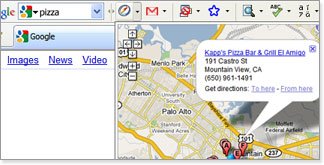Google Brings ‘My Location’ To The Desktop
Knowing where a searcher is when s/he conducts a search is one of the big promises and opportunities in mobile search. Advertisers want the precise targeting, and it’s also a convenience for the user who doesn’t need to indicate a location when looking for products and services. There are already several tools and services that […]
Knowing where a searcher is when s/he conducts a search is one of the big promises and opportunities in mobile search. Advertisers want the precise targeting, and it’s also a convenience for the user who doesn’t need to indicate a location when looking for products and services. There are already several tools and services that include location as part of the mobile search experience, but Google has added location-based web searching on the desktop via a new, beta version of the Google Toolbar.
The new toolbar includes Google’s “My Location” technology, which was introduced in 2007 for mobile searching. Using the toolbar, users can search for a generic term like “pizza” and get local results:

Google describes how this works:
Google Toolbar with My Location uses information about surrounding Wi-Fi access points to estimate your location. Naturally, this means it won’t work if you’re on a computer that doesn’t have Wi-Fi (or has Wi-Fi turned off).
Hmmmm. You might be thinking that this sounds familiar. Just a couple weeks ago, I wrote about Google’s expansion of local search results on non-local searches — you can type “pizza” on Google.com and now get local results. But that targeting is based on the IP address of the searcher’s ISP, and is often not nearly as precise as what the new toolbar offers.
That’s why this announcement is important — it’s a big step toward more precise local targeting on the desktop, the kind of targeting usually reserved only for mobile devices.
Google also announced a new, simplified Chinese-language Google Toolbar, both of which are available in the also-new Google Toolbar Labs.
Contributing authors are invited to create content for Search Engine Land and are chosen for their expertise and contribution to the search community. Our contributors work under the oversight of the editorial staff and contributions are checked for quality and relevance to our readers. The opinions they express are their own.
Related stories
New on Search Engine Land